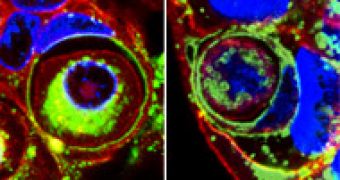There are cases when death can be a really good thing. Imagine, for instance, the cancer cells. However, so far, only two ways of cell death have been known: apoptosis (when the cell destroys itself) and phagocytosis (when the cell is digested by another cell). Now a new type of cell death has been found: entosis, when a cell crawls inside other cells to be destroyed.
The phenomenon has been spotted 25 years ago, but its significance has been recently investigated by a team led by cell biologist Michael Overholtzer of Harvard Medical School in Boston in healthy breast cells; the results of the investigation were published recently in the journal Cell.
Cultured breast cells usually grow on a matrix, like inside the breast, but when they escape freely from the matrix, some cells seem to be wrapped by other cells. The analyses revealed that 70% of these cells died, 9% multiplied while wrapped and 18% escaped unharmed.
Blocking the pathways of apoptosis and phagocytosis did not impede the process, and indeed, further investigation discovered that entosis was controlled by cadherins, proteins involved in maintaining cells connected.
At the moment, the scientists can only guess that entosis is provoked by an impairment in adhesion forces between two cells when they detach from the matrix, as one cell pushing into the other can end up being swallowed.
Entosis seems to be a conmon phenomenon, encountered in breast, ovarian, umbilical cord, and kidney cancer cells. "Tumor suppression may be one function of entosis. When a chemical that inhibits entosis was applied to a line of breast cancer cells, colony formation--an indicator of tumor growth in vitro--increased 10-fold," said Overholtzer.
But entosis could also be employed by the cancer cells, as "a way for a tumor cell to escape recognition by chemotherapeutic drugs or the immune system by hiding out inside another cell," said Maureen Murphy, a molecular biologist at Fox Chase Cancer Center in Philadelphia, Pennsylvania, pointing to the fact that not all cells die during entosis.
Some are less optimistic about these results.
"The fact that some cells survive entosis suggests that it is not a very effective process for suppressing tumors and raises concern that it may be a phenomenon that primarily occurs in the lab rather than in the body," said Craig Thompson, a cancer biologist at the University of Pennsylvania.

 14 DAY TRIAL //
14 DAY TRIAL //